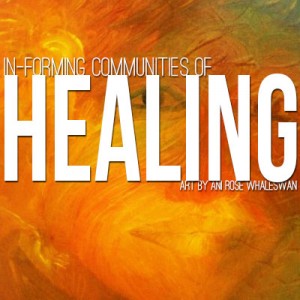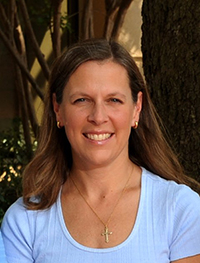In-forming Communities of Healing
by Marcia Mount Shoop, MDiv’96
 Surviving sexualized violence resonates with surviving violence of many kinds—especially violence that is personalized, violence that penetrates our flesh, our self-understanding, and our ability to connect with the world around us.
Surviving sexualized violence resonates with surviving violence of many kinds—especially violence that is personalized, violence that penetrates our flesh, our self-understanding, and our ability to connect with the world around us.
Survival skills are idiosyncratic, and they are often wise in ways we can only understand fleetingly. These survival skills can deaden and disconnect us. They can leave our nerve endings raw and exposed. And these survival skills permeate and help shape a world—a world that sometimes re-harms, sometimes supports, and oftentimes wants to move along as if everything is as it should be.
The ubiquity and idiosyncrasy of these survival skills means that anyone can be triggered by anything at any time. This statement may be jarring. We are more often told something different about trauma healing: to compartmentalize it, label it, and keep it separate from the “normal” modes of operation that we are supposed to embody
And this startling statement is also a truth that needs increased audibility in the spaces we want to claim as sacred, as healing, as transformative, and maybe even as “safe.”
As a survivor of sexual violence, safe space is something I no longer anticipate. As a theologian I want to explore other kinds of spaces and languages for what we need as human beings and human communities for healing to be a living, breathing reality. Safety may not be possible for many of us, or for any of us, but vitality, connection, and trust can be.
This embodied dynamic is the locus and focus of the work we are engaged in together at Vanderbilt Divinity School in the In-Forming Communities of Healing Initiative.
The truths that bodies have to tell hold great promise for a community like Vanderbilt Divinity School—a community who yearns to practice its aspirations of being a liberative, empowering, and healing space in response to the realities of violence.
These bodies of ours are portals into life-giving habits for communities of faith in a world where violence leaves its repetitive marks. And yet, our bodies have not been invited into such prominence in most ecclesial and academic spaces. And such neglect diminishes our lives and communities; and this neglect renders abusive patterns of power more stealthy and harder to extract.
And being attentive to bodies in new ways creates redemptive possibilities that I am seeing emerge in many different ways at Vanderbilt Divinity School.
» Improvisational collaboration and power sharing cultivate connection and generosity.
» The courage of survivors willing to share stories that are untellable surfaces potent truth.
» Experiences and gifts being added together to give birth to art, to poetry, to body sculptures, and to new worship forms narrate stories words can’t touch.
» Dissonant voices and experiences can connect and practice what it means to hear, to speak truth, and to inhabit unresolved spaces in ways that heal.
No doubt, these are but the birth pangs of a beautiful and redemptive unfolding in our midst.
 Vanderbilt Divinity School is partnering with theologian, author, and minister The Rev. Marcia Mount Shoop (MDiv Vanderbilt 1996; PhD Emory University 2003) to explore the how this community can becoming more intentionally attentive and healing around sexual violence and other kinds of abuses of power. Rev. Mount Shoop returns to VDS Feb 17 – 19, 2015 with a series of events that can be found here: In-forming Communities of Healing
Vanderbilt Divinity School is partnering with theologian, author, and minister The Rev. Marcia Mount Shoop (MDiv Vanderbilt 1996; PhD Emory University 2003) to explore the how this community can becoming more intentionally attentive and healing around sexual violence and other kinds of abuses of power. Rev. Mount Shoop returns to VDS Feb 17 – 19, 2015 with a series of events that can be found here: In-forming Communities of Healing